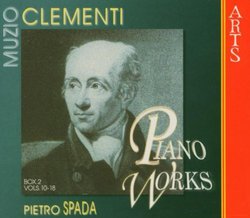| All Artists: Muzio Clementi, Pietro Spada, George Darden Title: Muzio Clementi: Piano Works, Box 2, Vols. 10-18 (Box Set) Members Wishing: 1 Total Copies: 0 Label: Arts Music Release Date: 1/1/2003 Album Type: Box set Genres: Special Interest, Classical Styles: Opera & Classical Vocal, Ballets & Dances, Dances, Chamber Music, Forms & Genres, Fantasies, Short Forms, Sonatas, Toccatas, Historical Periods, Classical (c.1770-1830), Instruments, Keyboard Number of Discs: 9 SwapaCD Credits: 9 UPC: 600554752020 |
Search - Muzio Clementi, Pietro Spada, George Darden :: Muzio Clementi: Piano Works, Box 2, Vols. 10-18 (Box Set)
 | Muzio Clementi, Pietro Spada, George Darden Muzio Clementi: Piano Works, Box 2, Vols. 10-18 (Box Set) Genres: Special Interest, Classical
|
Larger Image |
CD Details |
CD ReviewsA Lot of Charming Clementi Snow Leopard | Urbana, IL | 11/30/2006 (4 out of 5 stars) "These days, Clementi seems best known for his six Op. 36 sonatinas, which are included in this collection (as disc 12). Long-forgotten is his role as virtually THE first keyboardist who composed exclusively for piano, as well as his later piano-building enterprise. Once deemed Mozart's equal in improvisation by an Emperor, and the editor and publisher of numerous works by Beethoven, this composer of 110 sonatas (think late Mozart sonatas, rather than Beethoven sonatas) is still largely ignored, even after some championing by Horowitz for a time.
This nine disc set, a companion to the nine-disc Vol. 1 also recorded by Pietro Spada, aims to change that and puts forth the second half of virtually everything by Clementi. As such, it is not possible to review all of the music here. Nevertheless, some broad remarks may be made. First, it should be noted that the discs in this set are also available individually. So if $110 seems a daunting price, one may graze the discs separately. Each runs about an hour. Additionally, there are a number of piecemeal recordings of different sonatas out there, including some by Horowitz. But since there is nothing definitively famous by Clementi, except perhaps his six Sonatinas, there's something very much to be said about having a complete collection by a single performer. Second, it must be noted that the sound quality is a bit spotty at times. There's a kind of stuffy-nose tone on Disc 11 that can be a bit obtrusive. For example, the op. 34, no. 2 sonata's opening movement sounds suspiciously tinny. Perhaps Disc 11 is not enough to be a deal-breaker for the whole set, but certainly audiophiles will not be able to "hear around it" to get at the admittedly not uninteresting sonatas included on the disc; definitely a shame that these pieces should perhaps go overlooked for that reason, since the Op. 34 sonatas may be precisely the ones Horowitz was referring to when he declared Clementi as sometimes equal to Beethoven at his best. Musically, Clementi dwells, stylistically and happily, between Mozart and Beethoven, oscillating smoothly from Classical to Romantic (as Beethoven did, but less extremely so). His sonatas are certainly "meaty," and generally run around 15 minutes, with a broad range of pianistic sentiments, expressions and charm. But perhaps what makes them most enjoyable is their liveliness. While self-evidently "Classical era" music, this is not Northern European Classical per se (Mozart, Haydn, early Beethoven); the verve of late Italian Baroque is still very much felt here. It is, more precisely, a Classicism that has not entirely foregone affective musical elements in favor of form. The music is also, comparatively speaking, very easy to play, while nevertheless being trickier than a lot of Mozart at times. This is one reason it is not much recorded, and certainly not in a complete cycle like this. In fact, the six Sonatinas are best known precisely because countless piano students have essayed one or all of them in their graduating difficulty. Which brings up one of the most wonderful things about this collection. Spada performs these pieces with an immense degree of good sense. Or perhaps the truth is that this is as far in the piano repertoire as he can go. If so, then thank goodness for it, since it is completely wonderful to hear a pianist not trying to turn these pieces into grand concert hall works by applying warp-speed tempos and a too-precious technique. These are not virtuosos pieces, and needn't be played as such, for the same reason that Bach's tiny Minuet in G Major should not be turned into a virtuoso showpiece either. This is nowhere so perfectly apparent as on Disc 12, which presents all six of the famous Sonatinas. Presented with grace, simplicity, and all of the charm of a student recital (in the best and most accomplished sense of the word), Clementi's most-played, least-recorded pieces are given a wonderful airing. If, indeed, the Sonatinas are the only pieces you know by Clementi, then the recordings here will not only be rewarding, but might certainly tempt one to check out the rest of his body of work. Elegance without conceit, charm without gush, simplicity without simple-mindedness--Spada brings out the most elemental, basic joys to be found in music that Clementi himself wrote into his works. One cannot compare him to the titanism of Beethoven's loftiest sonatas, or the structural genius of Mozart, but neither was he aiming for it. There's a sweetness and fanfare to his music that is just plain good-natured, something like the kind of big-hearted humanness in Schubert (with the emotional outbursts in a more restrained register, however). Or, putting it another way, in almost fourteen discs (in Vol. 1 and 2), there are only three sonatas in a minor key. Overall, while it's easy enough to imagine these many pieces being played better, it's very difficult to imagine them being played more ideally." |

 Track Listings (11) - Disc #1
Track Listings (11) - Disc #1